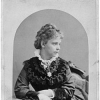Alice Morse Earle

Alice Morse Earle
Alice Morse Earlewas an American historian and author from Worcester, Massachusetts. She was christened Mary Alice by her parents Edwin Morse and Abby Mason Clary. On 15 April 1874, she married Henry Earle of New York, changing her name from Mary Alice Morse to Alice Morse Earle. Her writings, beginning in 1890, focussed on small sociological details rather than grand details, and thus are invaluable for modern social historians. She wrote a number of books on colonial Americasuch as Curious...
NationalityAmerican
ProfessionHistorian
Date of Birth27 April 1851
CountryUnited States of America
The clock is running. Make the most of today. Time waits for no man. Yesterday is history. Tomorrow is a mystery. Today is a gift. That's why it is called the present.
Half the interest of a garden is the constant exercise of the imagination.
Half the interest of a garden is the constant exercise of the imagination. You are always living three, or indeed six, months hence. I believe that people entirely devoid of imagination never can be really good gardeners. To be content with the present, and not striving about the future, is fatal.
The grape Hyacinth is the favorite spring flower of my garden - but no! I though a minute ago the Scilla was! and what place has the Violet? the Flower de Luce? I cannot decide, but this I know - it is some blue flower.
When the first settlers landed on American shores, the difficulties in finding or making shelter must have seemed ironical as well as almost unbearable.
It is heartrending to read the entries in many an old family Bible - the records of suffering, distress, and blasted hopes.
It is easy to gain a definite notion of the furnishing of colonial houses from a contemporary and reliable source - the inventories of the estates of the colonists.
In the early days of the New England colonies, no more embarrassing or hampering condition, no greater temporal ill, could befall any adult Puritan than to be unmarried.
In the seventeenth century, the science of medicine had not wholly cut asunder from astrology and necromancy; and the trusting Christian still believed in some occult influences, chiefly planetary, which governed not only his crops but his health and life.
Salem houses present to you a serene and dignified front, gracious yet reserved, not thrusting forward their choicest treasures to the eyes of passing strangers; but behind the walls of the houses, enclosed from public view, lie cherished gardens, full of the beauty of life.
Our Puritan forefathers, though bitterly denouncing all forms and ceremonies, were great respecters of persons; and in nothing was the regard for wealth and position more fully shown than in designating the seat in which each person should sit during public worship.
Few of the early houses in New England were painted, or colored, as it was called, either without or within. Painters do not appear in any of the early lists of workmen.
One of the earliest institutions in every New England community was a pair of stocks. The first public building was a meeting-house, but often before any house of God was builded, the devil got his restraining engine.
The first meeting-houses were often built in the valleys, in the meadow lands; for the dwelling-houses must be clustered around them, since the colonists were ordered by law to build their new homes within half a mile of the meeting-house.